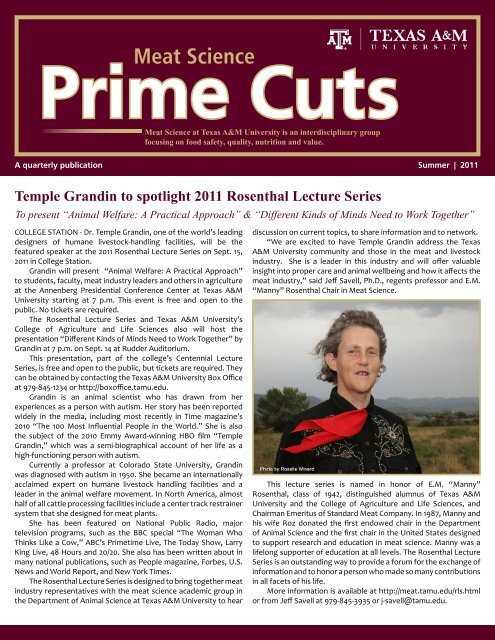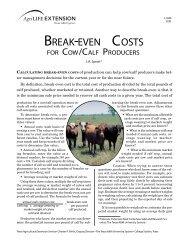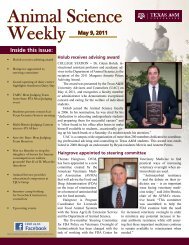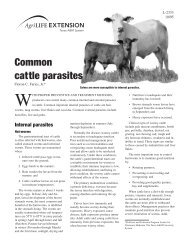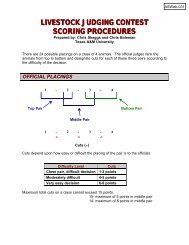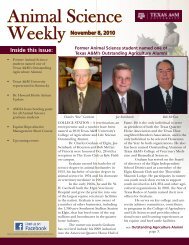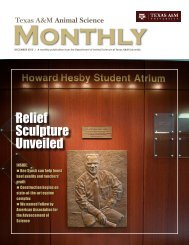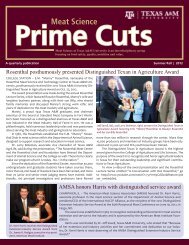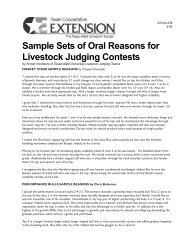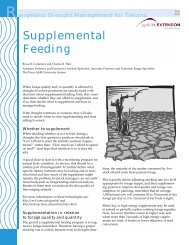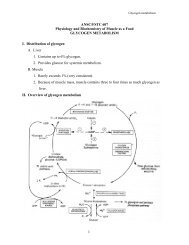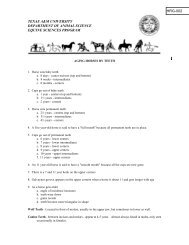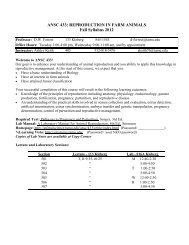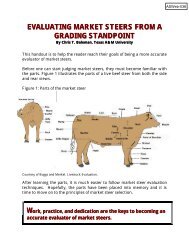Prime Cuts Summer 2011 - Department of Animal Science - Texas ...
Prime Cuts Summer 2011 - Department of Animal Science - Texas ...
Prime Cuts Summer 2011 - Department of Animal Science - Texas ...
You also want an ePaper? Increase the reach of your titles
YUMPU automatically turns print PDFs into web optimized ePapers that Google loves.
Meat <strong>Science</strong><br />
<strong>Prime</strong> <strong>Cuts</strong><br />
Meat <strong>Science</strong> at <strong>Texas</strong> A&M University is an interdisciplinary group<br />
focusing on food safety, quality, nutrition and value.<br />
A quarterly publication <strong>Summer</strong> | <strong>2011</strong><br />
Temple Grandin to spotlight <strong>2011</strong> Rosenthal Lecture Series<br />
To present “<strong>Animal</strong> Welfare: A Practical Approach” & “Different Kinds <strong>of</strong> Minds Need to Work Together”<br />
COLLEGE STATION - Dr. Temple Grandin, one <strong>of</strong> the world’s leading<br />
designers <strong>of</strong> humane livestock-handling facilities, will be the<br />
featured speaker at the <strong>2011</strong> Rosenthal Lecture Series on Sept. 15,<br />
<strong>2011</strong> in College Station.<br />
Grandin will present “<strong>Animal</strong> Welfare: A Practical Approach”<br />
to students, faculty, meat industry leaders and others in agriculture<br />
at the Annenberg Presidential Conference Center at <strong>Texas</strong> A&M<br />
University starting at 7 p.m. This event is free and open to the<br />
public. No tickets are required.<br />
The Rosenthal Lecture Series and <strong>Texas</strong> A&M University’s<br />
College <strong>of</strong> Agriculture and Life <strong>Science</strong>s also will host the<br />
presentation “Different Kinds <strong>of</strong> Minds Need to Work Together” by<br />
Grandin at 7 p.m. on Sept. 14 at Rudder Auditorium.<br />
This presentation, part <strong>of</strong> the college’s Centennial Lecture<br />
Series, is free and open to the public, but tickets are required. They<br />
can be obtained by contacting the <strong>Texas</strong> A&M University Box Office<br />
at 979-845-1234 or http://box<strong>of</strong>fice.tamu.edu.<br />
Grandin is an animal scientist who has drawn from her<br />
experiences as a person with autism. Her story has been reported<br />
widely in the media, including most recently in Time magazine’s<br />
2010 “The 100 Most Influential People in the World.” She is also<br />
the subject <strong>of</strong> the 2010 Emmy Award-winning HBO film “Temple<br />
Grandin,” which was a semi-biographical account <strong>of</strong> her life as a<br />
high-functioning person with autism.<br />
Currently a pr<strong>of</strong>essor at Colorado State University, Grandin<br />
was diagnosed with autism in 1950. She became an internationally<br />
acclaimed expert on humane livestock handling facilities and a<br />
leader in the animal welfare movement. In North America, almost<br />
half <strong>of</strong> all cattle processing facilities include a center track restrainer<br />
system that she designed for meat plants.<br />
She has been featured on National Public Radio, major<br />
television programs, such as the BBC special “The Woman Who<br />
Thinks Like a Cow,” ABC’s <strong>Prime</strong>time Live, The Today Show, Larry<br />
King Live, 48 Hours and 20/20. She also has been written about in<br />
many national publications, such as People magazine, Forbes, U.S.<br />
News and World Report, and New York Times.<br />
The Rosenthal Lecture Series is designed to bring together meat<br />
industry representatives with the meat science academic group in<br />
the <strong>Department</strong> <strong>of</strong> <strong>Animal</strong> <strong>Science</strong> at <strong>Texas</strong> A&M University to hear<br />
discussion on current topics, to share information and to network.<br />
“We are excited to have Temple Grandin address the <strong>Texas</strong><br />
A&M University community and those in the meat and livestock<br />
industry. She is a leader in this industry and will <strong>of</strong>fer valuable<br />
insight into proper care and animal wellbeing and how it affects the<br />
meat industry,” said Jeff Savell, Ph.D., regents pr<strong>of</strong>essor and E.M.<br />
“Manny” Rosenthal Chair in Meat <strong>Science</strong>.<br />
This lecture series is named in honor <strong>of</strong> E.M. “Manny”<br />
Rosenthal, class <strong>of</strong> 1942, distinguished alumnus <strong>of</strong> <strong>Texas</strong> A&M<br />
University and the College <strong>of</strong> Agriculture and Life <strong>Science</strong>s, and<br />
Chairman Emeritus <strong>of</strong> Standard Meat Company. In 1987, Manny and<br />
his wife Roz donated the first endowed chair in the <strong>Department</strong><br />
<strong>of</strong> <strong>Animal</strong> <strong>Science</strong> and the first chair in the United States designed<br />
to support research and education in meat science. Manny was a<br />
lifelong supporter <strong>of</strong> education at all levels. The Rosenthal Lecture<br />
Series is an outstanding way to provide a forum for the exchange <strong>of</strong><br />
information and to honor a person who made so many contributions<br />
in all facets <strong>of</strong> his life.<br />
More information is available at http://meat.tamu.edu/rls.html<br />
or from Jeff Savell at 979-845-3935 or j-savell@tamu.edu.
<strong>Texas</strong> A&M meat science team wins national quiz bowl<br />
MANHATTAN, KAN -- A team <strong>of</strong> students from the <strong>Texas</strong> A&M<br />
University <strong>Department</strong> <strong>of</strong> <strong>Animal</strong> <strong>Science</strong> won the national<br />
championship in the American Meat <strong>Science</strong> Association (AMSA)<br />
Intercollegiate Quiz Bowl.<br />
The competition, considered the academic ‘Super Bowl’ in<br />
the world <strong>of</strong> meat science, was held June 19 during the AMSA’s<br />
<strong>2011</strong> Reciprocal Meat Conference held at Kansas State University<br />
in Manhattan, Kan.<br />
Two teams from <strong>Texas</strong> A&M competed against 29 teams<br />
from 18 universities. The A&M maroon team <strong>of</strong> Jae Ebeling from<br />
Plainview, Jessica Steger from Del Valle and Lance Wheeler from<br />
Dallas stood undefeated through the competition, beating North<br />
Dakota State University in the final round.<br />
A second A&M team <strong>of</strong> Trey Brooks from Llano, Rachel<br />
Glascock from Pilot Point and Lauren Thompson <strong>of</strong> Grandview<br />
finished in the top eight. Kaitlin Shaw from San Antonio served<br />
as alternate.<br />
“These seven students have been studying all facets <strong>of</strong> the<br />
meat and livestock industries and the meat and animal sciences<br />
for the past six months. I consider them all national champions,”<br />
said Dan Hale, pr<strong>of</strong>essor, Extension meat specialist and team<br />
coordinator. “The contest preparation and participation have<br />
prepared these students to be the next key leaders in the food,<br />
meat or animal industries.”<br />
The quiz bowl is designed to encourage interaction among<br />
students from different universities, increase student interest in<br />
the area <strong>of</strong> meat science and provide a field for friendly competition<br />
within academia.<br />
Front left, Jessica Steger, Kaitlin Shaw, Jae Ebeling, Lauren<br />
Thompson and Lance Wheeler. Back left, Trey Brooks,<br />
Kayla Nelson, Rachel Glascock and Carson Ulbrich.<br />
The teams are divided into a double elimination bracket. Each<br />
round consists <strong>of</strong> 40 questions on meat safety, quality and<br />
chemistry; muscle biology; animal physiology; meat production<br />
and industry history and current events; and human nutrition<br />
and health.<br />
The team was coached by graduate students Carson Ulbrich<br />
<strong>of</strong> Jourdanton, Kayla Nelson from Houston and Adria Grayson<br />
from Childress. In preparation for the contest, the team members<br />
trained with the coaches as well as the meat science faculty<br />
in the <strong>Department</strong> <strong>of</strong> <strong>Animal</strong> <strong>Science</strong>.<br />
TAMU Meat Judging Team Reunion: Sept. 15-18, <strong>2011</strong><br />
Registration Registration to attend the TAMU Meat Judging Team Reunion on<br />
Sept. 15-18, <strong>2011</strong> in College Station can be made online at https://secure.touchnet.<br />
com/C21490_ustores/web/store_main.jsp?STOREID=37 or by mail. Registration<br />
deadline is September 9, <strong>2011</strong>.<br />
Agenda Thursday, Sept. 15: Rosenthal Lecture Series featuring Temple Grandin.<br />
This event will begin at 7 p.m. in the Annenberg Presidential Conference Center at<br />
the George Bush Presidential Library and Museum.<br />
Friday, Sept. 16: Come & Go Social with silent auction will begin at 7 p.m. at the G.<br />
Rollie White Visitor’s Center located at the O.D. Butler Jr. <strong>Animal</strong> <strong>Science</strong> Complex.<br />
Saturday, Sept. 17: Open House from 10-noon at the Rosenthal Meat <strong>Science</strong> and<br />
Technology Center; An overview <strong>of</strong> the judging team program including Meat<br />
Judging Team introductions and recognition <strong>of</strong> former teams will be held from<br />
noon to 1 p.m.; <strong>Prime</strong> Rib Sandwich lunch will begin at 1 p.m.; Tailgating for the evening football game will begin at 2 p.m. in front <strong>of</strong><br />
Rosenthal; TAMU vs. University <strong>of</strong> Idaho football game begins at 6 p.m. Tickets can be purchased at http://www.12thmanfoundation.<br />
com/ticket-center/football/meat-judging.aspx. The tickets are $50 each with a $5 handling charge.<br />
Sunday, Sept. 18: Dr. G.C. Smith Scholarship Golf Tournament begins at 8 a.m. at the Briarcrest Country Club. Registration for the golf<br />
tournament can be made online at https://secure.touchnet.com/C21490_ustores/web/store_main.jsp?STOREID=37 or by mail.<br />
Hotel A hotel block has been arranged at the Super 8 on <strong>Texas</strong> Avenue. Call 979-846-8860<br />
and ask for group name - TAMU Meat Judging Team; event - Reunion<br />
Website Go to http://animalscience.tamu.edu/newsandevents/news_meat_judging_team_<br />
reunion.htm for more information and to access a printable copy <strong>of</strong> the reunion registration<br />
form and the golf tournament entry form, and a complete agenda. For more information, contact<br />
Davey Griffin at or call 979-845-3935.<br />
Page <strong>Prime</strong> 2 | <strong>Prime</strong> <strong>Cuts</strong> | <strong>Cuts</strong> Page 2<br />
Support the<br />
<strong>Texas</strong> A&M<br />
Meat Judging Team<br />
at giving.tamu.edu/<br />
SupportMeat.
Meat <strong>Science</strong> researchers receive USDA funding<br />
to enhance fresh produce safety<br />
COLLEGE STATION -- A group <strong>of</strong> researchers<br />
led by food microbiologists in the meat<br />
science section in the <strong>Department</strong> <strong>of</strong> <strong>Animal</strong><br />
<strong>Science</strong> has been awarded a four-year<br />
$500,000 grant from the U.S. <strong>Department</strong><br />
<strong>of</strong> Agriculture to train graduate students<br />
and conduct fundamental research investigating<br />
the interactions <strong>of</strong> bacterial<br />
pathogenic microorganisms with the surfaces<br />
<strong>of</strong> different produce commodities.<br />
Bacterial pathogens such as Escherichia<br />
coli O157:H7 and Salmonella have in<br />
recent years been linked to multiple outbreaks<br />
<strong>of</strong> foodborne disease in the United<br />
States and across the world, many <strong>of</strong> these<br />
outbreaks resulting in hundreds <strong>of</strong> cases<br />
<strong>of</strong> human disease and even multiple fatalities.<br />
The contamination and adherence <strong>of</strong><br />
pathogens to produce surfaces represents<br />
one <strong>of</strong> the key events in the food production<br />
chain where active interventions must<br />
be applied in order to reduce the risk <strong>of</strong><br />
foodborne disease for consumers.<br />
The project is led by Matthew Taylor,<br />
assistant pr<strong>of</strong>essor <strong>of</strong> food microbiology<br />
in the meat science section. Additionally,<br />
Alejandro Castillo, associate pr<strong>of</strong>essor <strong>of</strong><br />
food microbiology in the meat science<br />
section, Luis Cisneros-Zevallos, associate<br />
pr<strong>of</strong>essor <strong>of</strong> horticultural sciences (<strong>Texas</strong><br />
A&M) and Mustafa Akbulut, assistant<br />
pr<strong>of</strong>essor <strong>of</strong> chemical engineering (<strong>Texas</strong><br />
A&M) complete the multi-disciplinary research<br />
team that possesses expertise not<br />
only in the microbiological safety <strong>of</strong> produce,<br />
but also the physiology <strong>of</strong> produce<br />
and the development <strong>of</strong> food-grade antimicrobial<br />
nanoencapsulation and delivery<br />
systems.<br />
In addition to studying the interactions<br />
<strong>of</strong> pathogens on produce surfaces,<br />
the team will develop and explore nanoscale<br />
systems for decontamination <strong>of</strong><br />
pathogen-contaminated smooth, rough,<br />
netted, and leafy post-harvest produce.<br />
Food antimicrobials will be effectively delivered<br />
to differing produce items in order<br />
to reduce pathogen loads on produce<br />
items, increasing their safety in a more effective<br />
manner.<br />
“We are very excited to initiate such<br />
studies, not only because <strong>of</strong> the development<br />
<strong>of</strong> new produce disinfection technologies<br />
that will improve the safety <strong>of</strong><br />
these commodities, but also the multi-disciplinary<br />
nature <strong>of</strong> the research team and<br />
the opportunity for significant collaborative<br />
research. Each investigator brings an<br />
essential and unique set <strong>of</strong> skills and perspective,<br />
enhancing the quality and usefulness<br />
<strong>of</strong> the research completed,” said<br />
Taylor.<br />
Project funding was provided in conjunction<br />
with the Agriculture and Food<br />
Research Initiative (AFRI) Competitive<br />
Grants Program, directed by the USDA National<br />
Institute <strong>of</strong> Food and Agriculture.<br />
For more information or questions regarding<br />
this research or food safety microbiology<br />
research conducted, contact Taylor<br />
at 979-845-1541 or matt_taylor@tamu.<br />
edu.<br />
4th Korea-United States International Joint Symposium to be held Nov. 1-2<br />
COLLEGE STATION -- The 4th annual Korea-United States International<br />
Joint Symposium: Producing High Quality Beef for the<br />
Global Market will be held Nov. 1-2, <strong>2011</strong> in College Station.<br />
The first day <strong>of</strong> the symposium will focus on topics related<br />
to the importance <strong>of</strong> producing high-quality beef for the United<br />
States, Asia and Latin America, as well as the use <strong>of</strong> growth-promoting<br />
feed additives in the production <strong>of</strong> high-quality beef. The<br />
second day <strong>of</strong> the event will include a tour <strong>of</strong> 44 Farms in Cameron,<br />
<strong>Texas</strong> and discussion about the impact <strong>of</strong> byproducts (distiller’s<br />
grains, cooking oils and glycerin) on carcass quality.<br />
“The International Joint Symposium is designed to foster<br />
international trade <strong>of</strong> beef, with primary focus on high-quality<br />
beef,” said Stephen Smith, pr<strong>of</strong>essor in the <strong>Department</strong> <strong>of</strong><br />
<strong>Animal</strong> <strong>Science</strong> and event organizer. “This program will bring<br />
together experts in this field from Korea, Japan, Brazil and the<br />
United States to address demand and production <strong>of</strong> high-quality<br />
beef in the U.S., Asia, and Central and South America.”<br />
The Korea-United States International Joint Symposium was<br />
developed through a mutual interest in high-quality beef production<br />
between the <strong>Department</strong> <strong>of</strong> <strong>Animal</strong> <strong>Science</strong> at <strong>Texas</strong> A&M,<br />
<strong>Texas</strong> AgriLife Research, and the National Institute <strong>of</strong> <strong>Animal</strong> <strong>Science</strong><br />
(NIAS) <strong>of</strong> the Rural Development Administration, Republic<br />
<strong>of</strong> South Korea. The NIAS hosted the first and third symposia in<br />
2005 and 2009, respectively, and <strong>Texas</strong> A&M University hosted<br />
the second international symposium in 2007.<br />
Registration to attend the symposium is now open and can<br />
be made online or through the mail. Go to http://animalscience.<br />
tamu.edu/symposium/registration.html for registration details.<br />
Cost to attend is $150 if registered by October 21, <strong>2011</strong> and<br />
$200 afterwards. There is no charge for <strong>Texas</strong> A&M University<br />
faculty and students.<br />
For more information or a complete list <strong>of</strong> speakers and the<br />
agenda, go to http://animalscience.tamu.edu/symposium.<br />
<strong>Prime</strong> <strong>Cuts</strong> | Page 3
Researching the Perfect Steak<br />
Aroma, taste evaluated by <strong>Texas</strong> AgriLife Research scientist<br />
COLLEGE STATION – Both taste and aroma are key factors one<br />
meat scientist is using to learn more about producing a better<br />
tasting steak.<br />
Dr. Chris Kerth, a <strong>Texas</strong> AgriLife Research meat scientist and<br />
associate pr<strong>of</strong>essor in the <strong>Department</strong> <strong>of</strong> <strong>Animal</strong> <strong>Science</strong> at <strong>Texas</strong><br />
A&M University, is using AromaTrax technology in his laboratory<br />
to evaluate both aroma and flavor.<br />
“We analyze all methods <strong>of</strong> sensory (input) using taste and<br />
aroma,” said Kerth, who was recently featured on National Public<br />
Radio’s <strong>Science</strong> Friday broadcast from San Antonio. Kerth<br />
also presented his research at the <strong>Texas</strong> A&M Beef Cattle Short<br />
Course in College Station, sponsored by the <strong>Texas</strong> AgriLife Extension<br />
Service.<br />
AromaTrax uses gas chromatography/mass spectrometry<br />
coupled with a human “sniff port” to separate volatile compounds<br />
in the air around the hot, cooked sample, he said.<br />
“Part <strong>of</strong> the sample goes to the machine that identifies the<br />
chemical compound, while a person sits at the sniff port and<br />
smells each <strong>of</strong> the compounds,” he said.<br />
When they detect an odor, they click on a computer screen<br />
to match the aroma and intensity.<br />
“The computer then matches the chemical compound to the<br />
aroma and intensity,” Kerth said. This allows an aroma/sensory<br />
pr<strong>of</strong>ile to be developed for each product.<br />
“Since each <strong>of</strong> the fatty acids and other meat components<br />
serve as precursors to the volatile compounds that we smell and<br />
taste, a direct link can be made between the sensory trait and the<br />
actual chemical compounds in the meat,” Kerth said.<br />
The proprietary s<strong>of</strong>tware, coupled with the powerful chemical<br />
identification capability <strong>of</strong> the machine, “is a great tool to describe<br />
flavor and aroma pr<strong>of</strong>iles,” Kerth said.<br />
Some <strong>of</strong> his research objectives are to determine the effect<br />
<strong>of</strong> diet (forage, distillers grain) on flavor, optimum temperature<br />
for grilling particular beef cuts, if flavor is increased by altering<br />
cooking methodology, optimum conditions for aging beef, and<br />
optimizing genetics and developing a strategy to enhance beef’s<br />
greatest asset — its flavor, he said.<br />
Page <strong>Prime</strong> 4 | <strong>Prime</strong> <strong>Cuts</strong> | <strong>Cuts</strong> Page 2<br />
Kerth’s research may branch out beyond meat science, he<br />
said, possibly using the lab to research other food products in the<br />
future.<br />
“We can use the machine to evaluate virtually every volatile<br />
chemical compound in food to see what are the most valuable<br />
traits,” he said. “It’s exciting technology that we hope to use to<br />
create more value for food products in the future.”<br />
Kerth serves as expert panelist on<br />
National Public Radio science program<br />
SAN ANTONIO -- Dr. Chris<br />
Kerth, associate pr<strong>of</strong>essor<br />
<strong>of</strong> meat science and muscle<br />
biology in the <strong>Department</strong><br />
<strong>of</strong> <strong>Animal</strong> <strong>Science</strong>, served<br />
as a guest panelist on <strong>Science</strong><br />
Friday, a national radio<br />
talk show broadcast live on<br />
National Public Radio July 8,<br />
<strong>2011</strong> from San Antonio.<br />
Kerth, along with two<br />
other expert panelists, were<br />
invited to the show to discuss<br />
“Using <strong>Science</strong> to Raise<br />
the Perfect Porterhouse” with host <strong>of</strong> the show Ira Flatow.<br />
The 40-minute discussion included talk on producing the perfect<br />
steak, from how genes affect tenderness and marbling to<br />
how grass and grain affect the type <strong>of</strong> fat in a cut <strong>of</strong> beef.<br />
<strong>Science</strong> Friday is a weekly science talk show broadcast live<br />
over public radio stations nationwide as part <strong>of</strong> NPR’s “Talk <strong>of</strong><br />
the Nation” programming. Each week, the host and his expert<br />
panelists focus on current scientific topics and present an educated,<br />
balanced discussion on the topic.<br />
To listen to the July 8 show, please go to http://www.sciencefriday.com/program/archives/<strong>2011</strong>07081.<br />
Meat <strong>Science</strong> students presented Bob Ondrusek Scholarship at annual convention<br />
SAN ANTONIO -- Seven <strong>Texas</strong> A&M University<br />
meat science students received<br />
a Bob Ondrusek Memorial Scholarship<br />
given by the Southwest Meat Association<br />
Foundation, presented during<br />
the SMA Annual Convention held in<br />
San Antonio July 21-24, <strong>2011</strong>. The SMA<br />
Foundation awarded approximately<br />
$25,000 in Ondrusek Scholarships, the<br />
largest amount ever awarded. In addition,<br />
each recipient was given a travel<br />
stipend to assist with expenses. The<br />
students were recognized during the annual President’s Dinner and Dance.<br />
Those receiving scholarships from <strong>Texas</strong> A&M are (front, left) Leslie Frenzel, Rachel<br />
Glascock, Jim Ondrusek, Bob Ondrusek’s son and Vice-President <strong>of</strong> Columbia Packing<br />
Company, Ashley Haneklaus and Haley Grimes. (Back, left) Gatlan Gray, Russell McKeith<br />
and Amanda Smith.<br />
Also at the convention, Jessica Steger,<br />
a senior animal science major, and Cody<br />
Labus, right, a meat science graduate<br />
student, were recognized as recipients<br />
<strong>of</strong> the SmiKids Scholarships, an award<br />
they each received in the spring during<br />
the Saddle and Sirloin Club Banquet.
Aggie cow bones sent to help Arizona Diamondbacks’ hitters<br />
Don Baylor, Arizona Diamondbacks’ hitting coach, hones<br />
a bat on a device made with an Aggie cow bone.<br />
The E.M. “Manny” Rosenthal Meat <strong>Science</strong> and Technology<br />
Center received a strange request recently: cow bones to hone<br />
baseball bats for the Arizona Diamondbacks.<br />
Jeff Savell, regents pr<strong>of</strong>essor and E.M. “Manny” Rosenthal<br />
chairholder, received a call from friend Frank Seale, a retired<br />
coach and administrator who lives in College Station. Seale said<br />
he needed cow bones for the Diamondbacks<br />
to use to hone their<br />
bats. Savell found out that one<br />
<strong>of</strong> Seale’s former players from<br />
his days in Austin is Don Baylor,<br />
long time Major League player<br />
and manager, who is now the hitting<br />
coach for the Diamondbacks.<br />
Baylor knew that Seale had cows<br />
and thought that he may have<br />
cow bones lying around in the<br />
pasture. Fortunately for Seale,<br />
no cow bones were to be found<br />
so he contacted Savell to see if<br />
Savell could provide some bones<br />
for the team.<br />
Savell talked with Ray Riley,<br />
manager <strong>of</strong> the Rosenthal Center,<br />
to begin the process <strong>of</strong> figuring<br />
out what the purposes <strong>of</strong> the<br />
bones were. Searching the Internet<br />
revealed that Babe Ruth and Lou Gehrig <strong>of</strong> the New York<br />
Yankees used to sit in the dugout and rub their bats with cow<br />
bones to hone them so to close the wood pores and make the<br />
bats denser. Riley found a photo <strong>of</strong> another famous Yankee, Joe<br />
DiMaggio, rubbing his bat on a cow’s bone to hone it. Some articles<br />
refer to “boning” or “to bone” a bat, and some <strong>of</strong> today’s<br />
boutique wooden bat manufacturers use cow bones to hone<br />
bats before they are shipped to customers.<br />
In June <strong>2011</strong>, an array <strong>of</strong> cow bones, both cooked and uncooked,<br />
was assembled and shipped to the Diamondbacks for<br />
their use. A couple <strong>of</strong> weeks later, Savell along with graduate<br />
students, Haley Grimes and Melanie<br />
Moore, were in the Phoenix<br />
area conducting research, and<br />
through Seale, received an invitation<br />
to come to the Diamondbacks<br />
versus Cleveland Indians<br />
game as guests <strong>of</strong> Baylor. After<br />
the game, Baylor invited them<br />
to the batting cage area behind<br />
the dugout to see the Aggie<br />
cow bones in action. One <strong>of</strong> the<br />
cow femurs was attached to a<br />
sawhorse-type device between<br />
the batting cages and dugout for<br />
the players to hone their bats.<br />
Baylor demonstrated how bats<br />
are honed, and said that several<br />
players wanted to have similar<br />
devices made for them to hone<br />
their bats during the <strong>of</strong>f-season.<br />
Does honing bats with Aggie<br />
cow bones work? Well, since June, the Arizona Diamondbacks<br />
have moved into first place in the Western Division <strong>of</strong> the National<br />
League. Maybe there is something to the magic <strong>of</strong> honing bats<br />
or maybe there is magic to the Aggie cow bones. Can requests<br />
from the <strong>Texas</strong> Rangers and Houston Astros be far behind?<br />
Faculty, students present research at ICoMST meeting in Belgium<br />
GHENT, BELGIUM -- Meat <strong>Science</strong> faculty members Jeff Savell<br />
and Kerri Harris, along with graduate students Lindsey Mehall<br />
and Ashley Haneklaus, participated in the 57th annual International<br />
Congress <strong>of</strong> Meat <strong>Science</strong> and Technology in Ghent, Belgium,<br />
Aug. 7-12, <strong>2011</strong>. This gathering is the preeminent conference<br />
for meat scientists from around the world, and this year’s<br />
event spotlighted more than 450 invited and submitted presentations<br />
dealing with an array <strong>of</strong> topics <strong>of</strong> international interest.<br />
The group from <strong>Texas</strong> A&M presented four posters featuring<br />
research in food safety and nutrition. These include:<br />
Lemmons, J. L., L. M. Lucia, M. D. Hardin, J. W. Savell, and K. B.<br />
Harris. <strong>2011</strong>. Efficacy <strong>of</strong> washing and/or trimming beef subprimals<br />
as a decontamination method for Escherichia coli<br />
O157:H7. Paper P218 in Proc. Int. Congr. Meat Sci. Technol.,<br />
Ghent, Belgium.<br />
Muras, T. M., K. B. Harris, L. N. Mehall, A. N. Haneklaus, M. D. Hardin,<br />
L. M. Lucia, and J. W. Savell. <strong>2011</strong>. Escherichia coli O157:H7<br />
and Salmonella Typhimurium penetration during vacuum<br />
tumbling and survivability during storage in marinated beef.<br />
Paper P248 in Proc. Int. Congr. Meat Sci. Technol., Ghent,<br />
Belgium.<br />
Smith, A. M., K. B. Harris, A. N. Haneklaus, and J. W. Savell. <strong>2011</strong>.<br />
Quality grade and degree <strong>of</strong> doneness effects on nutrient<br />
Left, Jeff Savell, Lindsey Mehall, Ashley Haneklaus and<br />
Kerri Harris.<br />
content <strong>of</strong> beef top loin steaks. Paper P134 in Proc. Int. Congr.<br />
Meat Sci. Technol., Ghent, Belgium.<br />
West, S. E., K. B. Harris, A. N. Haneklaus, J. W. Savell, L. D. Thompson,<br />
J. C. Brooks, J. K. Pool, A. M. Luna, T. E. Engle, J. S.<br />
Schutz, K. E. Belk, and L. W. Douglass. <strong>2011</strong>. Obtaining information<br />
for beef chuck cuts for a national nutrient database<br />
in the United States. Paper P135 in Proc. Int. Congr. Meat Sci.<br />
Technol., Ghent, Belgium.<br />
<strong>Prime</strong> <strong>Cuts</strong> | Page 5
Meat<strong>Science</strong>Workshops<br />
COLLEGE STATION -- Foodways <strong>Texas</strong> and the <strong>Department</strong> <strong>of</strong> <strong>Animal</strong><br />
<strong>Science</strong> co-hosted the first-ever Barbecue <strong>Summer</strong> Camp June<br />
3-5, <strong>2011</strong> at the Rosenthal Center. Forty food pr<strong>of</strong>essionals and<br />
backyard enthusiasts attended, all with a passion for learning how to make the best barbecue possible. Meat science faculty Dr.<br />
Davey Griffin, Dr. Jeff Savell, and Ray Riley served as coordinators and instructors for the camp. Don Palmer and meat science graduate<br />
students assisted with the demonstrations. Dr. Christine Alvarado, staff, and students from the <strong>Department</strong> <strong>of</strong> Poultry <strong>Science</strong><br />
provided instruction on poultry products. Jeff and Jackie Savell and former student Bryan Bracewell <strong>of</strong> Southside Market and BBQ,<br />
Elgin, <strong>Texas</strong>, hosted a pig roast at the Savell home attended by the participants and instructors.<br />
Other speakers at the camp included Ranzell “Nick” Nickelson from Standard Meat Company who spoke about the chemistry <strong>of</strong><br />
wood smoke and food safety, and Chef Ed Harazak from Adams Extract and Spice who lectured on the use <strong>of</strong> various spices and seasonings.<br />
Robb Walsh, Foodways <strong>Texas</strong> founding member and multiple James<br />
Beard awardee, guided the group to Martin’s Barbecue in Bryan for a tour and<br />
discussion <strong>of</strong> the history <strong>of</strong> <strong>Texas</strong> barbecue, and he showed the participants<br />
barbecue films from Foodways <strong>Texas</strong> and Southern Foodways Alliance.<br />
The event was attended by Greg Morago, food editor at The Houston Chronicle,<br />
who wrote an article on the event called “Camp ‘Cue,” complete with recipes<br />
for Barbecued Beef Brisket and <strong>Texas</strong>-Style Beef Ribs. In the article, Morago<br />
writes, There is a brotherhood <strong>of</strong> barbecue. By the second day <strong>of</strong> class fast friendships<br />
have formed over discussions <strong>of</strong> smoke ring, bark, brine, caramelization, <strong>of</strong>fset<br />
fireboxes, and other barbecue-nalia. A love <strong>of</strong> smoke and meat has created<br />
an instant fraternity. It is clear that barbecue has powers far beyond pleasing the<br />
palate.<br />
Jeff Savell ... is well aware <strong>of</strong> barbecue’s social outreach.<br />
‘If you learn how to barbecue you’ll always have friends,’ Savell jokingly tells us.<br />
Only it’s not a joke. Savell, who has taught many an Aggie passing through meat sciences, oversees a freshman class where barbecue<br />
is taught for no other reason than to build better relationships among students and faculty. Using barbecue as social integration might<br />
sound odd to anyone outside <strong>of</strong> <strong>Texas</strong>. But it is a genius networking tool that already has bonded our classmates, especially on this second<br />
day <strong>of</strong> camp filled with beef and pork anatomy. Every inch <strong>of</strong> massive sides <strong>of</strong> beef and whole pork are dissected to better understand<br />
where cuts <strong>of</strong> barbecue come from.”<br />
To view Morago’s article, go to http://www.chron.com/disp/story.mpl/life/food/7630629.html.<br />
Thermal Processing Workshop<br />
Page <strong>Prime</strong> 6 | <strong>Prime</strong> <strong>Cuts</strong> | <strong>Cuts</strong> Page 2<br />
Barbecue <strong>Summer</strong> Camp<br />
COLLEGE STATION -- Graduate students and<br />
their advisors from several universities and<br />
meat industry leaders gathered June 1-2,<br />
<strong>2011</strong> at <strong>Texas</strong> A&M University for the inaugural Thermal Processing Workshop hosted by the meat science section in the <strong>Department</strong><br />
<strong>of</strong> <strong>Animal</strong> <strong>Science</strong>. The Thermal Processing Workshop taught meat science graduate students pr<strong>of</strong>essional skills needed to succeed<br />
in the meat industry beyond what is taught in conventional textbook or classroom learning.<br />
“The industry needs graduates with an understanding <strong>of</strong> thermal processing, and this workshop provided a unique opportunity<br />
for students to gain a better perspective <strong>of</strong> thermal processing<br />
throughout all phases <strong>of</strong> processed meats production,” said Dr. Chris<br />
Kerth, meat science pr<strong>of</strong>essor and event organizer. “The goal <strong>of</strong> the<br />
program was to increase the knowledge <strong>of</strong> thermal processing and<br />
expose graduate students to careers in the processed meat industry.”<br />
Topics included principles <strong>of</strong> forced-air convention ovens, the<br />
science <strong>of</strong> smoking, development <strong>of</strong> cooking processes, process lethality,<br />
stabilization, and data analysis. The program included classroom<br />
sessions and hands-on application through the production<br />
<strong>of</strong> various processed meat products at the <strong>Texas</strong> A&M University<br />
Rosenthal Meat <strong>Science</strong> and Technology Center.<br />
Students from <strong>Texas</strong> A&M University, Angelo State University,<br />
<strong>Texas</strong> A&M University - Kingsville, <strong>Texas</strong> Tech University, Tarleton<br />
State University, Auburn University and University <strong>of</strong> Wisconsin participated<br />
as well as several leaders from top meat processing companies.<br />
The event was sponsored by Johnsonville Sausage, West Liberty<br />
Foods, Townsend/Marel and J Bar B Foods.
COLLEGE STATION -- Though herds are smaller, the<br />
pr<strong>of</strong>it-margin potential is greater for those venturing Grass-Fed Beef Conference<br />
into the grass-fed beef business, according to experts.<br />
A recent grass-fed beef conference at <strong>Texas</strong> A&M University, sponsored by the <strong>Texas</strong> AgriLife Extension Service, featured experts<br />
and producers discussing several aspects <strong>of</strong> an emerging industry sector. Attendees had the opportunity to learn about several topical<br />
areas, including fundamentals <strong>of</strong> growing forages, nutrient needs <strong>of</strong> cattle, beef processing, economic sustainability, and production<br />
and marketing.<br />
“We had far more registrants than we had initially predicted,” said Rick Machen, AgriLife Extension beef cattle specialist. “This<br />
aspect <strong>of</strong> beef production obviously is gaining more attention, and there is a hunger for information on how to get started or become<br />
more pr<strong>of</strong>itable. I think we identified several areas that gave producers some take-home ideas and an overall broad view <strong>of</strong> what is<br />
going on in the beef industry right now.”<br />
NAMP CENTER OF THE PLATE - The North American Meat Processors Association and <strong>Texas</strong> AgriLife Extension <strong>Animal</strong> <strong>Science</strong><br />
jointly hosted a Center <strong>of</strong> the Plate Conference May 3-5, <strong>2011</strong>. The Center <strong>of</strong> the Plate Conference has become an annual event<br />
and brings in meat purchasing pr<strong>of</strong>essionals, purveyors, military procurement <strong>of</strong>ficers and others to learn Institutional Meat Purchase<br />
Specifications and their applications from former USDA/AMS employee Steve Olsen and Davey Griffin.<br />
Beef 101 - Two sessions <strong>of</strong> Beef 101 were held on May 17-19 and June 6-8, <strong>2011</strong>. Both sessions <strong>of</strong> the program were attended by beef<br />
industry pr<strong>of</strong>essionals from 18 states and five foreign countries representing 32 major companies throughout the world, including<br />
major packer, retailer, food service, chefs and restaurateurs and beef associations. Beef 101 is in its 23rd year <strong>of</strong> supplying essential<br />
information about beef to industry pr<strong>of</strong>essionals seeking to increase their knowledge base.<br />
Pork 101 - The 14th annual Pork 101 at <strong>Texas</strong> A&M was held May 24-26, <strong>2011</strong>. Pork 101 was developed by a grant to <strong>Texas</strong> A&M<br />
University, the University <strong>of</strong> Nebraska and Michigan State University and is coordinated by the American Meat <strong>Science</strong> Association<br />
with assistance by the National Pork Board. Typically, 3-4 Pork 101 courses are <strong>of</strong>fered annually at participating universities across the<br />
U.S. The workshop allows pork and associated industry pr<strong>of</strong>essionals a hands-on approach at learning more about the pork industry<br />
from live animal handling through pork fabrication and processed meat processing to palatability. Davey Griffin coordinates this<br />
workshop with major assistance from Rhonda Miller, Jodi Sterle, Dan Hale, Ray Riley, Jake Franke, Kerri Harris, Ashley Haneklaus and<br />
Chris Kerth, plus numerous meat science graduate students.<br />
Publications<br />
Haneklaus, A. N., J. M. Hodgen, R. J. Delmore, T. E. Lawrence, D. A. Yates, D. M. Allen, D. B. Griffin, and J. W. Savell. <strong>2011</strong>. Effects <strong>of</strong><br />
zilpaterol hydrochloride on retail yields <strong>of</strong> subprimals from beef and calf-fed Holstein steers. J. Anim. Sci. 89: 2867-2877.<br />
Smith, A. M., K. B. Harris, A. N. Haneklaus, and J. W. Savell. <strong>2011</strong>. Proximate composition and energy content <strong>of</strong> beef steaks as influenced<br />
by USDA quality grade and degree <strong>of</strong> doneness. Meat Sci. 89: 228-232.<br />
McNeill, S. H., K. B. Harris, T. G. Field, and M. E. Van Elswyk. The evolution <strong>of</strong> lean beef: Identifying lean beef in today’s U.S. marketplace.<br />
Meat Sci. (<strong>2011</strong>), doi: 10.1016/j.meatsci.<strong>2011</strong>.05.023.<br />
News in Brief<br />
NMA Advanced HACCP Workshop -- National Meat Association<br />
(NMA) held its Advanced HACCP workshop on May 10-11,<br />
<strong>2011</strong> in Oakland, Calif., with Kerri Harris and Jeff Savell serving<br />
as instructors. This hands-on workshop gave participants<br />
a more developed understanding <strong>of</strong> HACCP. Harris and Savell<br />
went over each participant’s hazard analysis determinations,<br />
CCPs, critical limits, and supporting documents to help clarify<br />
potential issues that participants would have with the way<br />
HACCP plans were written.<br />
Oakland BIFSCo Workshop -- Kerri Harris conducted a presentation<br />
and discussion on behalf <strong>of</strong> the Beef Industry Food<br />
Safety Council (BIFSCo) entitled, “Know Your Process and<br />
Know the Regulations” on May 11 in Oakland. Participants<br />
were given guidance on how communication and cooperation<br />
between suppliers and customers are necessary for the<br />
production <strong>of</strong> safe food.<br />
In memory <strong>of</strong> Emilie Oevermann<br />
HOUSTON -- Emilie Oevermann passed away<br />
June 15, <strong>2011</strong> at the age <strong>of</strong> 47. Oevermann<br />
received a bachelor’s degree from the<br />
<strong>Department</strong> <strong>of</strong> <strong>Animal</strong> <strong>Science</strong> in 1985. As<br />
a student, Oevermann was a member <strong>of</strong><br />
the TAMU Meat Judging Team in 1983. She<br />
worked in the meat science section as a<br />
student worker and was active in the Saddle<br />
& Sirloin Club. After graduation, Oevermann<br />
worked in the <strong>Department</strong> <strong>of</strong> <strong>Animal</strong> <strong>Science</strong><br />
as an academic advisor and was coordinator<br />
for the Aggie REPS. Most recently, she<br />
was employed by Wells Fargo as a project manager. For more<br />
information, please visit http://www.memorialoakschapel.com.<br />
<strong>Prime</strong> <strong>Cuts</strong> | Page 7
Dr. Jeff Savell<br />
Meat <strong>Science</strong> Section<br />
<strong>Department</strong> <strong>of</strong> <strong>Animal</strong> <strong>Science</strong><br />
<strong>Texas</strong> A&M University<br />
2471 TAMU<br />
College Station, TX 77843-2471<br />
Upcoming Events<br />
Date Event Contact<br />
<strong>2011</strong><br />
Sept. 13-15 SMA/<strong>Texas</strong> A&M HAACP Phyllis Zimmerman<br />
Dec. 6-8 Course, College Station (979) 846-9011<br />
phyllis@southwestmeat.org<br />
Sept. 14-15 Rosenthal Lecture Series: Jeff Savell<br />
Temple Grandin (979) 845-3935<br />
Hog Splash<br />
Meat science students participated<br />
in Hog Splash, a mud volleyball tournament<br />
hosted by Slovacek Sausage held in August. The event was<br />
organized to raise funds for Hospice <strong>of</strong> Brazos Valley. The students<br />
contributed their own money to enter the event, and though they<br />
did not win the tournament, they had a great time trying! Pictured<br />
above is, from left, Leslie Frenzel, Russell McKeith, Joshua Garcia,<br />
Jacob Lemmons, Gatlan Gray, Rachel Glascock, Meagan Igo, and<br />
Amanda Harbison. Not pictured are Kayla Nelson and Matthew<br />
Hendricks.<br />
Sept. 15-18 TAMU Meat Judging Davey Griffin<br />
Team Reunion (979) 845-3935<br />
Nov. 1-2 4th annual Korea-US Stephen Smith<br />
International Joint Symp (979) 845-3939<br />
Dec. 7-9 Beef 101 Davey Griffin<br />
College Station (979) 845-3935<br />
agrilifevents@ag.tamu.edu<br />
To receive an electronic copy <strong>of</strong> <strong>Prime</strong> <strong>Cuts</strong>, please send an email to<br />
. To update your address, please contact<br />
Tiffany Mooney at 979-862-3643.


